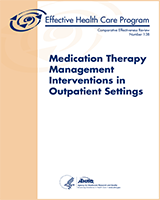| Adverse drug events | RCT: 2 (806) | Insufficient | Medium study limitations, inconsistent, direct, imprecise | Direction and magnitude of effect differs between the 2 trials. |
| Cognitive and physical function | RCT: 1 (133) | Insufficient | Medium study limitations, consistency unknown, direct, imprecise | No significant differences between arms. |
| Affective function | RCT: 2 (181) | Insufficient | Medium study limitations, inconsistent, direct, imprecise | One study with no significant calculated mean differences in depression or anxiety scores; the other study with significant differences in mean depression and anxiety scores, but no significant difference in percentage achieving a depression remission. |
| Mortality | RCT: 1 (181) | Insufficient | Medium study limitations consistency unknown, direct, imprecise | OR, 0.59; 95% CI, 0.12 to 2.49; p = 0.48. |
| Cohort: 2 (173,329) | Insufficient | High study limitations, inconsistent (magnitude), direct, imprecise | One study: OR, 0.5; 95% CI, 0.3 to 0.9. Second study: adjusted HR, 0.92; 95% CI, 0.87 to 0.96; p < 0.001. |
| Gastrointestinal bleeding events | Cohort: 1 (unclear) | Insufficient | High study limitations, consistency unknown, direct, imprecise | RRR, 60%; p = 0.001. |
| General health-related quality of life domains other than vitality and emotional role functioning | RCT: 3 (1,169) | Low for no benefit | Medium study limitations; consistent for physical role functioning, general health perceptions, and social functioning domains; inconsistent for physical functioning, bodily pain, and mental health domains; direct; precise | Variable mean difference with CIs consistently spanning the null effect. |
| General health-related quality of life for vitality and emotional role functioning domain | RCT: 3 (1,169) | Insufficient | Medium study limitations, consistent, direct, imprecise (not corrected for multiple comparisons or wide CIs) | Vitality: Mean difference of 2.797; 95% CI, 0.655 to 4.939; p = 0.010.
Emotional role functioning: Mean difference of 5.386; 95% CI, -7.244 to 18.013. |
| Condition-specific health-related quality of life (diabetes) | RCT: 1 (73) | Insufficient | Medium study limitations, consistency unknown, direct, imprecise, | Nonsignificant improvement of 0.1 point on a 5-point scale in the intervention group compared with no change in the control group. |
| Patient satisfaction | RCT: 3 (1,463) | Low for no benefit | Medium study limitations, consistent, direct, precise | No differences on 17 of 21 items of patient satisfaction; 4 statistically significant differences ranged in magnitude from -0.15 to -0.36, favoring MTM. |
| Activities of daily living | 0 | NA | NA | NA |
| Work or school absenteeism | 0 | NA | NA | NA |
| Patient and caregiver participation in medical care and decisionmaking | 0 | NA | NA | NA |
